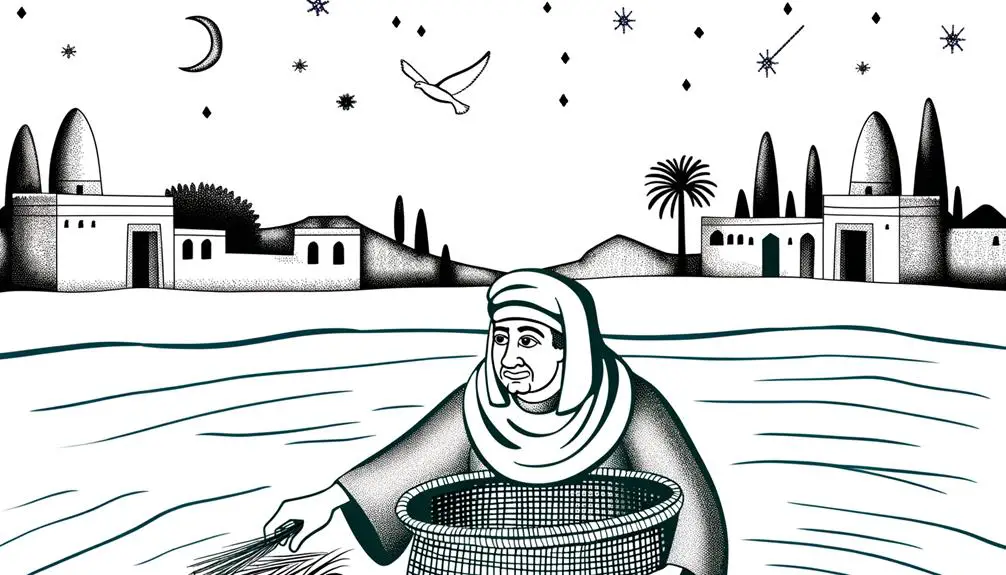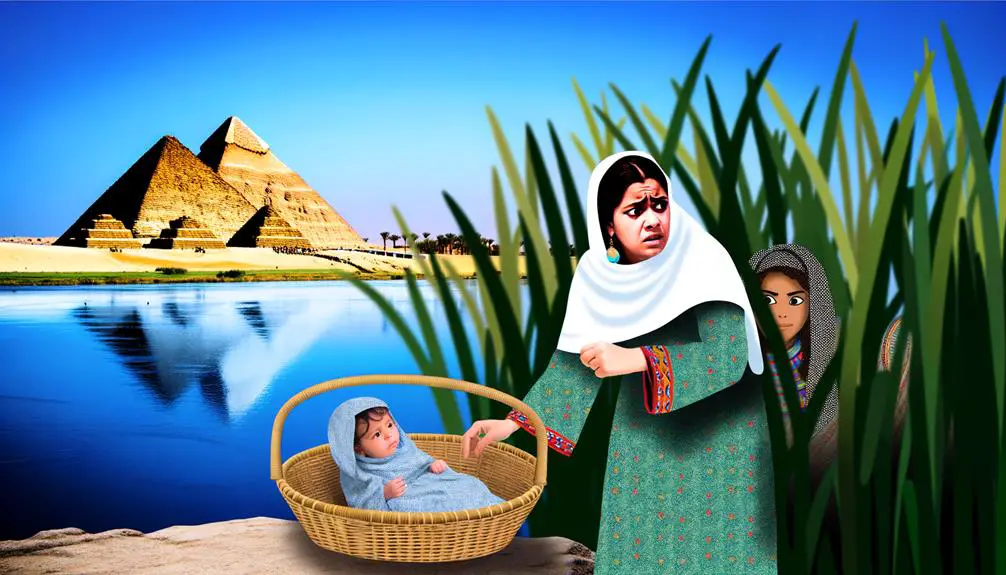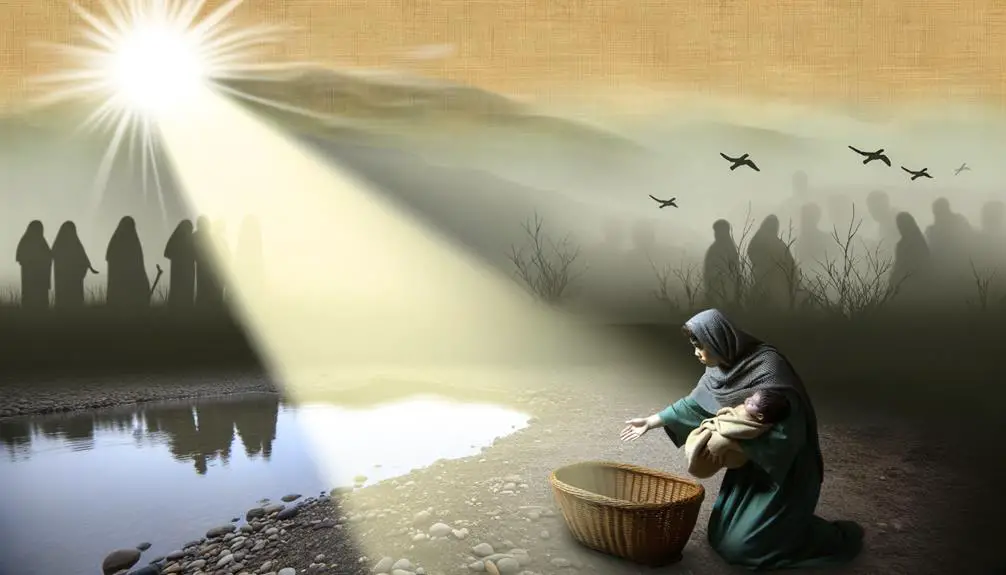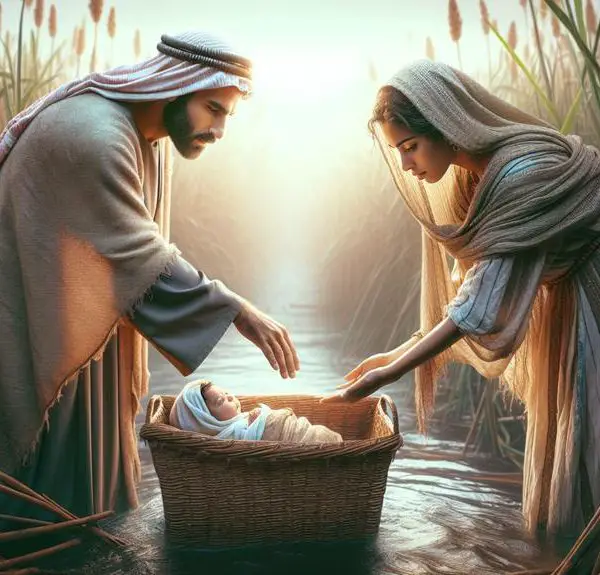Hidden in the reeds by his brave mother, Moses' survival story begins with a tale of love and faith that echoes through time.

Moses Mom in the Bible
Imagine the Nile's banks under a scorching sun, where a mother's heartbeats intertwine with the reeds, concealing her most precious treasure. You've likely heard of Moses, but it's his mother, Jochebed, whose faith and ingenuity set a monumental story in motion.
Her courage to save her son amidst dread and oppression paints a vivid picture of maternal love and divine trust. As you explore Jochebed's life, you'll uncover layers of resilience and wisdom that resonate beyond ancient texts.
Her legacy, woven into the fabric of history, beckons you to consider the profound impacts of faith and the enduring strength of a mother's love. Why does her story matter today? Let's find out together.
Key Takeaways
- Jochebed, Moses' mother, defied Pharaoh's decree to save her son, showcasing remarkable faith and courage.
- Her innovative river strategy for Moses' preservation highlights her deep trust in God's providence.
- Jochebed's actions not only ensured Moses' survival but also set the stage for his pivotal role in Hebrew history.
- As a symbol of maternal strength and innovation, Jochebed's legacy extends beyond her family, impacting religious and cultural identities.
The Early Life of Jochebed

Who was Jochebed before she became known as the mother of Moses, Aaron, and Miriam in the biblical narrative? To understand her early life, it's essential to delve into her family lineage and the cultural practices of her time. Jochebed, a daughter of Levi, was born into a family pivotal to the Israelite identity. Her lineage, deeply rooted in the Levitical tribe, positioned her within a context rich in religious and social responsibilities. This background likely influenced her character, instilling values that would later become evident in her actions.
Family lineage played a crucial role in the ancient world, dictating one's standing, occupation, and even marital choices. As a Levite, Jochebed's family was among those entrusted with the care of the tabernacle and the performance of religious rites. This heritage suggests that she was raised in an environment where adherence to spiritual practices and teachings was paramount. The cultural practices of her time, deeply intertwined with religious observance, would have shaped her daily life. From dietary laws to the observance of sacred festivals, these traditions underscored her existence, providing a framework that guided her actions and decisions.
In this context, Jochebed's early life was likely marked by a strong commitment to faith and community. The principles instilled by her family's lineage and the cultural practices of her people would have prepared her for the challenges she'd later face. This foundation, characterized by devotion and resilience, was instrumental in shaping the woman who'd become the mother of three pivotal figures in the biblical narrative.
Jochebed's Faith and Courage

You observe Jochebed's unwavering trust in God as a cornerstone of her actions, which starkly contrasts with the fear that gripped many others in her situation.
Her decision to defy Pharaoh's decree illustrates a profound courage rooted in faith, rather than mere defiance.
This act of protecting Moses bravely not only showcases her strength but also sets a pivotal foundation for the events that follow in biblical history.
Jochebed's Trust in God
Jochebed's unwavering trust in God, exemplified through her actions and decisions, reveals a profound level of faith and courage amidst daunting circumstances. Her reliance on divine intervention, coupled with her motherly instinct, showcases a remarkable blend of spiritual belief and natural affection.
This trust wasn't blind but was rooted in a deep understanding of her faith's tenets, reflecting an insightful anticipation of God's providential care. Her actions, underpinned by this trust, speak volumes about her character, illustrating a methodical and analytical approach to her situation.
Jochebed's example offers a compelling study in how faith and reason can coexist, guiding decisions in times of crisis with calmness and assurance, ultimately relying on a higher power for deliverance and protection.
Defying Pharaoh's Decree
Building on her profound trust in God, Moses' mother faced the ultimate test of faith and courage by defying Pharaoh's decree to kill all Hebrew male infants. Her actions exemplify a critical moment of resistance against Egyptian oppression.
This defiance wasn't merely an act of maternal love but a calculated risk that highlighted the severity of the Pharaoh's edict. The decree itself was a manifestation of Egyptian fear of Hebrew proliferation, an attempt to curb their growing numbers through infanticide.
The consequences of such an edict were far-reaching, not only threatening the immediate lives of Hebrew children but also aiming to dismantle their future generations. By resisting, Moses' mother not only protected her son but also struck a blow against the systemic attempt to erase her people's future.
Protecting Moses Bravely
In an act of unparalleled faith and courage, Moses' mother, known as Jochebed, employed a cunning strategy to protect her son from Pharaoh's deadly decree. Her actions reflect a profound understanding of ancient midwifery and river strategies, which she leveraged to ensure Moses' survival.
By placing him in a basket and setting him afloat on the Nile, Jochebed not only evaded the Pharaoh's mandate but also positioned Moses in a place where he could be found by Pharaoh's daughter. This methodical approach underlines the strategic thinking that ancient midwifery entailed, far beyond mere childbirth assistance.
Moreover, her river strategy showcases a deep knowledge of the Nile's dynamics and the social structures surrounding it, turning a perilous situation into a miraculous survival story.
The Birth of Moses

You must examine the context in which Moses was born, under Pharaoh's decree that all Hebrew male infants be killed, to understand the significance of his preservation.
This act of defiance by his mother, Jochebed, not only saved Moses but also set the stage for his eventual role in the deliverance of the Israelites.
Analyzing the miraculous preservation of Moses allows you to grasp the profound impact of faith and courage in the face of despair.
Pharaoh's Decree
Fear and insecurity propelled the Pharaoh to issue a decree that all Hebrew male infants must be thrown into the Nile, setting the stage for Moses' miraculous survival and eventual rise to leadership. This decree not only highlights the Pharaoh's attempt to curtail the growing Hebrew population but also sets into motion a series of events punctuated by Nile discovery and Adoption intrigue.
Emotion |
Cause |
Effect |
|---|---|---|
Fear |
Pharaoh's decree |
Hebrew families' despair |
Anticipation |
Moses' concealment |
Hope for deliverance |
Curiosity |
Nile discovery & Adoption |
Moses' unique upbringing |
Analyzing these aspects provides a deeper understanding of the socio-political dynamics at play and Moses' early life, illustrating the complexity of his origin story within the broader narrative of liberation and leadership.
Miraculous Preservation
Amidst the despair induced by Pharaoh's decree, the birth of Moses marks a pivotal moment of miraculous preservation that defies the dire circumstances. This event showcases a clear manifestation of divine intervention, pivotal in the unfolding narrative of the Israelites.
The strategic placement of Moses into a basket, set adrift on the Nile, embodies a profound act of faith by his mother. The subsequent river discovery by Pharaoh's daughter not only subverts the decree aimed at annihilating Hebrew boys but also sets the stage for Moses' eventual role as a liberator.
This series of events underscores the notion that divine orchestration operates beyond human comprehension, employing elements of the natural world to achieve divine purposes, thereby illustrating a meticulous pattern of preservation against overwhelming odds.
The Plan to Save Moses

In devising a strategy to safeguard Moses, his mother crafted a meticulously considered plan that involved placing him in a basket and setting it adrift on the Nile River. This approach, termed the River strategy, warrants a thorough analysis due to its innovative nature and the acute understanding of her environment it reflects. She didn't merely choose the river as a hideout; she recognized it as a conduit for potential salvation. The Nile, a vital waterway for the Egyptians, was frequented by many, increasing the chances of her son being found and subsequently saved.
The Basket preparation was equally critical in ensuring Moses' survival. The choice of materials, waterproofing techniques, and the basket's construction were all pivotal. His mother used papyrus, a material abundant along the Nile, known for its buoyancy and durability. She then applied pitch and tar, making the basket watertight, thus creating a secure and floatable vessel capable of protecting Moses from the water's dangers.
This plan wasn't only about physical survival but also about navigating a complex socio-political landscape. By setting Moses afloat near where the Pharaoh's daughter bathed, his mother maximized the likelihood of her son being discovered by a member of the royal family, thereby ensuring his safety and a future among Egypt's elite. This strategic placement underscores the depth of her understanding of Egyptian society and its hierarchies.
In essence, the River strategy and Basket preparation highlight a meticulously crafted plan born out of desperation but executed with precision and foresight.
Trusting God's Providence

Moses' mother's reliance on divine providence demonstrates a profound faith that guided her actions during a period of uncertainty. Her story is a compelling example of how trusting in a higher power can navigate us through the darkest times. This trust wasn't blind but was rooted in a deep understanding of divine timing and the nature of faith challenges. Let's explore the key aspects of her trust in God's providence:
- Recognition of Divine Timing: She understood that every action and event unfolds according to a divine plan. Her decision to place Moses in the Nile wasn't rushed but was taken with the belief that the timing was right for her child to be saved.
- Acceptance of Faith Challenges: Facing the decree that all Hebrew baby boys be killed, she didn't succumb to despair. Instead, she saw this challenge as a test of faith, one that required her to trust God's protection over her family.
- Adaptability to God's Plans: She adapted her actions in alignment with what she believed were signs of divine will. This adaptability highlights her unwavering faith in God's providence, even when the future seemed uncertain.
- Courage to Act on Faith: Her faith wasn't passive; it compelled her to take courageous actions. By placing Moses in the Nile, she demonstrated her trust in God's care and protection over her son's life.
Analyzing Moses' mother's journey, it's clear that her trust in divine providence was instrumental in navigating the challenges she faced. Her story teaches us the importance of faith, timing, and courage when confronted with life's uncertainties.
Jochebed's Legacy and Influence

Having explored how Jochebed's trust in divine providence guided her through times of uncertainty, we now turn our attention to the enduring legacy and influence of Moses' mother on subsequent generations. Jochebed's story is a testament to the power of maternal strength and its role in shaping cultural heritage. Her actions, driven by a profound faith and an unwavering commitment to her children's safety, have left an indelible mark on the narrative of resilience and courage.
Analyzing the impact of Jochebed, it's evident that her legacy transcends the boundaries of her immediate family. She embodies the epitome of maternal strength, her story serving as a beacon for mothers across generations who find themselves in the throes of adversity. Her ingenious and brave decision to save Moses by placing him in a basket on the Nile has been celebrated in countless retellings, highlighting her as a symbol of innovative and protective maternal love.
Moreover, Jochebed's influence extends to the preservation of cultural heritage. By ensuring Moses' survival, she inadvertently played a pivotal role in the continuation of the Israelite traditions and teachings. Moses, under her initial guidance, grew up to become a central figure in Jewish, Christian, and Islamic traditions, his laws and teachings forming the backbone of these faiths. Thus, Jochebed's impact isn't confined to her immediate act of saving her son but reverberates through the ages in the preservation and shaping of religious and cultural identities.
Reflections on Jochebed's Story

Reflecting on Jochebed's story, it's clear that her actions not only ensured her son's survival but also underscored the profound influence of maternal decisions on the course of history. This narrative offers a unique lens through which to examine the interplay between mother's intuition and cultural pressures. Here are four critical aspects to consider:
- The Role of Mother's Intuition: Jochebed's decision to hide Moses for three months, despite the Egyptian decree, showcases a mother's innate sense to protect her child at all costs. This intuition often transcends the fear of legal or societal repercussions, highlighting a deep, primal bond.
- Navigating Cultural Pressures: Jochebed lived in an era where her people were oppressed, and every male Hebrew baby was sentenced to death. Her choice to defy Pharaoh's order speaks volumes about the strength required to resist oppressive cultural pressures for the sake of one's family.
- Strategic Decision-Making: The strategic placement of Moses in a basket along the Nile, where Pharaoh's daughter frequently bathed, was no mere act of desperation but a calculated risk, informed perhaps by her understanding of the palace routines and the compassion of its inhabitants.
- Legacy Through Maternal Actions: Jochebed's actions not only ensured Moses's survival but also set into motion his destiny as the liberator of the Hebrews. This demonstrates how maternal decisions can ripple through history, affecting generations beyond the immediate family.
In essence, Jochebed's story is a compelling testament to the power of mother's intuition and the courage to stand against cultural pressures. Her narrative encourages a deeper appreciation of the complexities and the pivotal role mothers play in shaping history.
Frequently Asked Questions
How Does the Story of Jochebed Compare to Other Maternal Figures in Ancient Religious Texts Outside of the Bible?
When analyzing maternal myths and cross-cultural parallels, you'll find Jochebed's story has similar themes to other ancient religious texts. These narratives often highlight a mother's sacrifice, wisdom, and protective nature.
Comparing Jochebed to figures like Isis in Egyptian mythology or Demeter in Greek tales, you'll see a shared emphasis on maternal strength and resilience.
This analysis showcases the universal appreciation and reverence for motherhood across different cultures and epochs.
What Are the Historical and Cultural Implications of Jochebed's Actions in the Context of Ancient Egyptian Society?
Imagine the heart-wrenching decision to hide your newborn in the Nile, defying Pharaoh's decree. Jochebed's actions, while enigmatic, showcase a mother's desperation in ancient Egyptian society.
This act of Nile concealment wasn't just rebellion; it was a strategic survival tactic, reflecting the harsh realities of the time. Analyzing her choice offers a glimpse into societal norms, the value of life, and the complexities of maternal love in a period where both were perilously fragile.
How Has the Depiction of Jochebed in Art and Literature Evolved Over the Centuries?
You'll find that Jochebed's iconography and literary adaptations have evolved significantly over the centuries. Initially, portrayals focused on her maternal sacrifice, aligning closely with the cultural and religious narratives of the time.
However, as societal views shifted, so did the depictions. Modern interpretations often emphasize her courage and ingenuity, reflecting broader changes in how female figures are portrayed in art and literature.
This evolution mirrors broader trends in historical and cultural scholarship.
Are There Any Traditional Ceremonies or Practices Observed in Modern Religions That Honor Jochebed or Mothers Like Her?
In modern religions, there aren't specific ceremonies solely honoring Jochebed, but Mother's Day serves as a broader celebration of maternal figures, echoing themes of Feminine Divinity. This day reflects on virtues found in biblical narratives, like Jochebed's, embodying sacrifice and faith.
Analytically, while direct observances are scarce, the influence of such figures is acknowledged in practices celebrating motherhood, intertwining religious reverence with societal appreciation for maternal roles and figures.
What Are the Psychological Interpretations of Jochebed's Decision-Making and Its Impact on Moses' Leadership Style and Choices Later in Life?
You're examining how early life decisions and models shape leadership traits and emotional resilience.
Analyzing this, you'd find that decisions made by significant early figures can deeply influence a leader's approach. Specifically, the choice to ensure safety and instill values under dire circumstances fosters resilience and adaptable leadership styles.
This methodical analysis reveals that foundational experiences are crucial in developing a leader's ability to navigate challenges and inspire others effectively.
Conclusion
In analyzing Jochebed's narrative, we juxtapose her profound faith against the backdrop of despair in Egypt, illuminating her courage amidst fear.
Her strategic actions, guided by unwavering trust in divine providence, not only ensured Moses' survival but also shaped a legacy of resilience and faithfulness.
This scholarly examination reveals Jochebed as a pivotal figure, whose story, though often overshadowed, offers rich insights into the dynamics of faith, courage, and the indomitable spirit of a mother's love.



Sign up